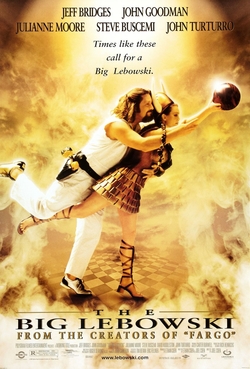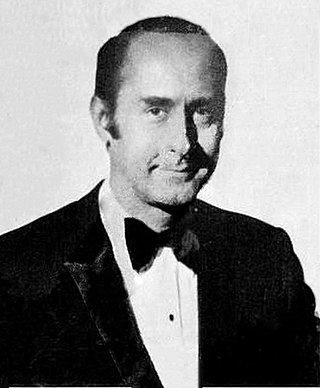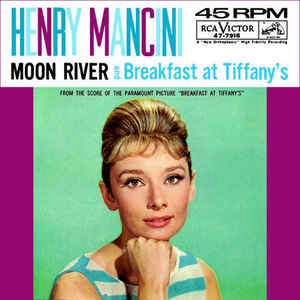
The Big Lebowski is a 1998 independent crime comedy film directed and co-written by Joel Coen, with producer brother Ethan Coen serving as co-writer. It stars Jeff Bridges as Jeffrey "The Dude" Lebowski, a Los Angeles slacker and avid bowler. He is assaulted as a result of mistaken identity, then learns that a millionaire, also named Jeffrey Lebowski, was the intended victim. The millionaire Lebowski's trophy wife is supposedly kidnapped, and millionaire Lebowski commissions The Dude to deliver the ransom to secure her release. The plan goes awry when the Dude's friend, Walter Sobchak, schemes to keep the ransom money for the Dude and himself. Sam Elliott, Julianne Moore, Steve Buscemi, John Turturro, Philip Seymour Hoffman, Tara Reid, David Thewlis, Peter Stormare, Jon Polito, and Ben Gazzara also appear in supporting roles.

Henry Mancini was an American composer, conductor, arranger, pianist and flutist. Often cited as one of the greatest composers in the history of film, he won four Academy Awards, a Golden Globe, and twenty Grammy Awards, plus a posthumous Grammy Lifetime Achievement Award in 1995.

Jimmie Dale Gilmore is an American country singer-songwriter currently living in Austin, Texas.

Hooverphonic is a Belgian band that was formed in October 1995. Though originally categorized as a trip hop group, they quickly expanded their sound to the point where they could no longer be described as a singular genre, but rather encompass alternative, electronica, electropop, rock, and a mixture of others. The band originally called themselves Hoover, but later changed their name to Hooverphonic after discovering other groups were already using the Hoover name and to avoid any legal issues with the vacuum cleaner company.

"Moon River" is a song composed by Henry Mancini with lyrics by Johnny Mercer. It was originally performed by Audrey Hepburn in the 1961 film Breakfast at Tiffany's, winning an Academy Award for Best Original Song. The song also won the 1962 Grammy Awards for Record of the Year and Song of the Year. In 1999, Mancini's recording was inducted into the Grammy Hall of Fame.
John Alfred Mandel was an American composer and arranger of popular songs, film music and jazz. The musicians he worked with include Count Basie, Frank Sinatra, Peggy Lee, Anita O'Day, Barbra Streisand, Tony Bennett, Diane Schuur and Shirley Horn. He won five Grammy Awards, from 17 nominations; his first nomination was for his debut film score for the multi-nominated 1958 film I Want to Live!
The Emotions are an American soul/R&B vocal group from Chicago. The group started out in gospel music but transitioned into R&B and disco music. The Emotions were named by VH1 as one of the 18 most influential girl groups of all time.
"Innamorata" is a song written in 1955. The music was written by Harry Warren and the lyrics by Jack Brooks.
"Baby Elephant Walk" is a song composed in 1961 by Henry Mancini for the 1962 film Hatari! Lyrics by Hal David were not used in the film version. The instrumental earned Mancini a Grammy Award for Best Instrumental Arrangement in 1963.
"Smile" is a song based on the theme song used in the soundtrack for Charlie Chaplin's 1936 film Modern Times.
"The Man in Me" is a song written by American singer-songwriter Bob Dylan and released as the 10th track on his 1970 album New Morning.

Mr. Lucky is a CBS adventure/drama television series that aired from 1959 to 1960. The title character, played by John Vivyan, was an honest professional gambler who used his plush floating casino, the ship Fortuna, as his base of operations. His good friend Andamo helped him run the casino.

No More Sweet Music is a double album by the Belgian band Hooverphonic. It is the group's fifth studio album, and was released in 2005. The first disc is titled More Sweet Music and contains 11 songs performed in the familiar Hooverphonic style, whilst the second disc contains the very same 11 songs in their remixed versions by Hooverphonic's main composer and programmer Alex Callier, and is titled NO More Sweet Music, a title indicative of the nature of the remixed versions, which also underlines the notable difference in style between the two discs. The singles released from this album are "You Hurt Me", "Wake Up", "Dirty Lenses" and "We All Float".
Richard Taylor Nash is an American jazz trombonist most associated with the swing and big band genres.
"Let's Face the Music and Dance" is a song published in 1936 by Irving Berlin for the film Follow the Fleet, where it was introduced by Fred Astaire and featured in a celebrated dance duet with Astaire and Ginger Rogers. The jazz song has also been covered by various artists years following its release, including Nat King Cole, Ella Fitzgerald, Frank Sinatra, Mel Torme, Todd Gordon and others.

"You Can't Hide Love" is a single by soul group Creative Source released in 1973 on Sussex Records. The song reached No. 48 on the Billboard Hot R&B Singles chart.
"Tu vuò fà l'americano" is a Neapolitan language song by Italian singer Renato Carosone.
"Peter Gunn" is the theme music composed by Henry Mancini for the television show of the same name. The song was the opening track on the original soundtrack album, The Music from Peter Gunn, released by RCA Victor in 1959. Mancini won an Emmy Award and two Grammys for Album of the Year and Best Arrangement. In 2005, the song was inducted into the Grammy Hall of Fame.

Sarah Vaughan Sings the Mancini Songbook is a 1965 album by Sarah Vaughan, of music composed by Henry Mancini.
Jon Burr is an American double bass player and author. He is a member of "Mark O'Connor's Hot Swing Trio", a swing jazz trio, along with Mark O'Connor and Frank Vignola. The trio has recorded three albums, Hot Swing! (2001), In Full Swing (2003), and Live in New York (2004).








